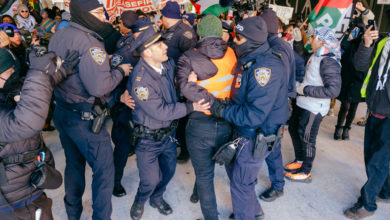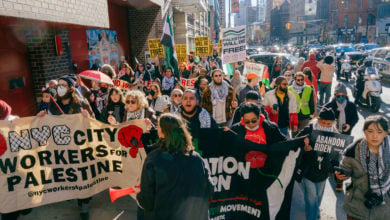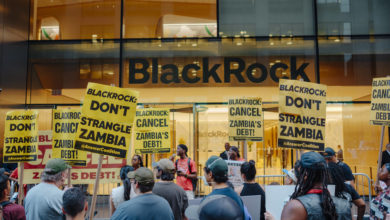On Jan. 8, around 100 tenants gathered in front of Brooklyn housing court to demand an extension of New York state’s eviction moratorium until at least June 2022, the permanent abolishing of winter evictions, as well as evictions without cause. The action was coordinated by Brooklyn Rapid Action Planning and attended by the Party for Socialism and Liberation, Crown Heights Tenants Union, Democratic Socialists of America, Brooklyn Eviction Defense, and Art Against Displacement.
For at least the fifth time since COVID swept New York in 2020, the New York State government is on the verge of allowing the state’s eviction moratorium to lapse. Currently, 250,000 households across the state are threatened with eviction. The current moratorium will end on Jan. 15, opening up the possibility of a wave of mass evictions at the same time that the state is seeing the highest-ever number of daily COVID cases.
“I think that we all know as New Yorkers how bad things have gotten in the past few weeks,” said Natalia Marques with the PSL. “What could possibly justify evicting someone right now? Who could possibly justify that? We’re in the dead of winter in one of the deadliest waves of the pandemic right now, and people are still trying to evict. Landlords think that their right to profit from our rent money is worth more than our human right to housing.”
Some public school teachers reminded the crowd that the current COVID crisis was particularly acute in schools, and that neither the state nor the city government intended to take action to halt the unprecedented spread of the virus in classrooms.
“Eric Adams is refusing to shut down schools,” stated school teacher Mustafa Al-Nomani. “Every day we’re getting 50% or less attendance at our schools because either the staff or students are sick. And what’s crazy about this new variant is that the kids are one of the larger targets, they’re getting infected at higher rates than they’ve ever been before. They’re taking it home, and they’re taking it to their grandparents, their families, and their parents. And their parents are taking it to their workplaces, and it continues to spread and hurt the people who can’t survive. … It can’t be sustained. The least we can do is provide people with the comfort that there are no evictions.”
After the rally, the crowd marched across the Brooklyn Bridge into Manhattan chanting, “All evictions gotta go,” and “Tenant power!” Drivers honked their horns in support and bus drivers raised their fists in the air, while others cheered in solidarity. The protesters marched to Manhattan housing court, pausing in front of the offices of the law firm Slochowsky & Slochowsky to draw attention landlord attorneys filing eviction cases throughout the pandemic.
‘The stakes are high, but our solidarity is higher’
On Nov.15, the state closed applications for its Emergency Rental Assistance Program (ERAP), which gave funds to landlords to cover the back rent of tenants who were unable to pay rent during the pandemic. However, a New York judge ordered the state to reopen its application process on Jan. 6. This court order may provide some extra protections for tenants, as they cannot be evicted for unpaid rent while their ERAP applications are under review, even if the eviction moratorium expires.
It remains unclear if the state will provide adequate funds to maintain the program. New York Governor Kathy Hochul and her administration claim the federal funds which backed ERAP are exhausted, and the federal government indicated it will not provide New York with adequate funds to meet the program’s needs.
But according to housing activists, New York state has the power to cancel the rent debt owed to landlords who have refused to accept ERAP payments. This would free up the funds allocated to uncooperative landlords.
“This is evidence that our movement continues to force concessions, and this is an easy concession for the state to make,” said Joel Feingold with the CHTU. “In the first half of the Cancel the Rent fight, we fought really really hard for the state to cancel rent, and of course they didn’t. But there is a clause in the ERAP statute that allows the state to cancel the rent debt of landlords who have refused ERAP payments. So if they really want to fund the program, they should cancel the rent of landlords who have refused the payments.”
Despite the state’s intransigence, housing activists are committed to fight to protect themselves, their families and their neighbors. Since New York’s first eviction moratorium was enacted nearly two years ago, the state has repeatedly attempted to scale back eviction protections.
Organizers, however, emphasized that the power to confront the state was in their hands.
“How many times have we won an extension of the eviction moratorium because we refuse to die, because we refuse to see our neighbors pushed out?” asked Feingold. “Every time! And it doesn’t mean that the victory is going to be easy. … It’s going to be a hard fight this time because all of capital, all of real estate, all the bosses, all the industries want us working to make profit and they don’t care if we get sick, they don’t care if we die, they don’t care if we get evicted. … The stakes are high, but our solidarity is higher.”
No to winter evictions! No to evictions without cause!
In addition to an extension of the eviction moratorium, the tenant movement is also demanding permanent good cause eviction protections. Under the current system, when a tenant’s lease lapses a landlord may refuse to grant a new lease and evict the tenant for no reason at all. Landlords are also empowered to raise rents in renewal leases by any amount, even if they know the tenant is unable to pay the higher rent. Landlords often use these powers to force out long-term tenants, replacing them with new tenants who can pay increasingly expensive rents.
Good cause eviction protection would grant tenants an automatic right to lease renewal, cap the amount that a landlord can increase rent when renewing a lease, and restrict the landlord’s power to evict to cases of so-called “good cause,” such as nonpayment of rent.
The tenant movement is also demanding a permanent ban on all winter evictions. Similar bans on winter evictions have been passed in other parts of the country.
While progressive legislators have shown support for these measures none have yet passed. Governor Hochul confirmed on Jan. 11 she will not extend the eviction moratorium beyond Jan. 15. Organizers, however, remain committed to the struggle. Should Hochul and the legislature force thousands of New Yorkers from their homes in the dead of winter amidst the worst-yet wave of the pandemic, the politicians may well find themselves in for a much more difficult fight than they anticipated.
“We’re gonna shut ‘em down. We are standing here to let them know we are not going nowhere,” said Joyce Webster, a tenant with the CHTU. “We’re gonna keep on fighting, we gonna fight on. They cannot stop us, and they cannot move us.”
Lead picture: Demonstrators in front of Manhattan courts. Liberation photo






